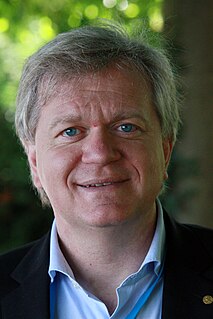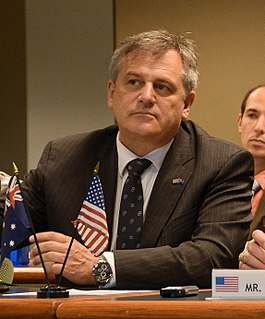Related Research Articles

The Commonwealth Scientific and Industrial Research Organisation (CSIRO) is an Australian Government agency responsible for scientific research.
The Defence Science and Technology Group (DSTG) is part of the Australian Department of Defence dedicated to providing science and technology support to safeguard Australia and its national interests. The agency's name was changed from Defence Science and Technology Organisation (DSTO) on 1 July 2015. It is Australia's second largest government-funded science organisation after the CSIRO and its research outcomes have enhanced Defence capability and supported operations for over 100 years.

Krishnaswamy Kasturirangan is an Indian space scientist who headed the Indian Space Research Organisation (ISRO) from 1994 to 2003. He is presently Chancellor of Central University of Rajasthan and NIIT University. He is the former chancellor of Jawaharlal Nehru University and the chairman of Karnataka Knowledge Commission. He is a former member of the Rajya Sabha (2003–09) and a former member of the now defunct Planning Commission of India. He was also the Director of the National Institute of Advanced Studies, Bangalore, from April 2004 to 2009. He is a recipient of the three major civilian awards from the Government of India: the Padma Shri (1982), Padma Bhushan (1992) and Padma Vibhushan (2000).
Hugh Francis Durrant-Whyte is a British-Australian engineer and academic. He is known for his pioneering work on probabilistic methods for robotics. The algorithms developed in his group since the early 1990s permit autonomous vehicles to deal with uncertainty and to localize themselves despite noisy sensor readings using simultaneous localization and mapping (SLAM).

David Ronald de Mey Warren was an Australian scientist, best known for inventing and developing the flight data recorder and cockpit voice recorder.

Brian Paul Schmidt is the Vice-Chancellor of the Australian National University (ANU). He was previously a Distinguished Professor, Australian Research Council Laureate Fellow and astrophysicist at the University's Mount Stromlo Observatory and Research School of Astronomy and Astrophysics. He is known for his research in using supernovae as cosmological probes. He currently holds an Australia Research Council Federation Fellowship and was elected a Fellow of the Royal Society (FRS) in 2012. Schmidt shared both the 2006 Shaw Prize in Astronomy and the 2011 Nobel Prize in Physics with Saul Perlmutter and Adam Riess for providing evidence that the expansion of the universe is accelerating, making him the only Montana-born Nobel laureate.
Vasudev Kalkunte Aatre is an Indian scientist and former head of the Defence Research and Development Organisation (DRDO), India's premier Defence research and development organization. In that capacity, he also served as the Scientific Advisor to the Defence Minister. He is a recipient of the Padma Vibhushan award.
Penny Diane Sackett is an American-born Australian astronomer and former director of the Research School of Astronomy and Astrophysics (RSAA) at the Australian National University (ANU). Professor Sackett was the Chief Scientist of Australia from November 2008 until March 2011.
John Wilcox Stocker AO is an Australian immunologist and the former Chairman of the Board of the Commonwealth Scientific and Industrial Research Organisation (CSIRO), the national government body for scientific research in Australia. Stocker is a former Chief Scientist of Australia.
A Sivathanu Pillai is an Indian scientist who formerly served as Honorary Distinguished Professor at Indian Space Research Organisation (2015-2018) and an honorary professor at IIT Delhi in the Department of Mechanical Engineering (2015-2016) and a Visiting Professor at Indian Institute of Science (2014-2015).
John Riley is an Australian scientist at the Defence Science and Technology Organisation and former Australian rules footballer who played with Footscray in the Victorian Football League (VFL) and North Adelaide in the South Australian National Football League (SANFL).

Alexander ‘Alex’ Zelinsky, is an Australian computer scientist, systems engineer and roboticist. His career spans innovation, science and technology, research and development, commercial start-ups and education. Zelinsky is Vice-Chancellor and President of the University of Newcastle joining the university in November 2018. He was the Chief Defence Scientist of Australia from March 2012 until November 2018. As Chief Defence Scientist he led Defence Science and Technology for Australia's Department of Defence.

Professor Tanya Mary Monro FAA FTSE FOSA FAIP GAICD is an Australian physicist known for her work in photonics. She has been Australia's Chief Defence Scientist since 8 March 2019. Prior to that she was the Deputy Vice Chancellor, Research and Innovation (DVCR&I) at the University of South Australia. She was awarded the ARC Georgina Sweet Australian Laureate Fellowship in 2013. She was the inaugural chair of photonics, the inaugural director of the ARC Centre of Excellence for Nanoscale Biophotonics and the inaugural director of the Institute for Photonics & Advanced Sensing (IPAS), and the inaugural director of the Centre of Expertise in Photonics (CoEP) within the School of Chemistry and Physics at the University of Adelaide. Monro has remained an adjunct professor of physics at the University of Adelaide following her departure from the institution.
Bernard Lewis Fanaroff is a South African astronomer and trade unionist. He served in many positions in the South African government related to labour unionism from 1994 to 2015. He is the co-developer of the Fanaroff–Riley classification, a method of classifying radio galaxies. He was the Project Director of South Africa's Square Kilometre Array bid.

Warrick John Couch is an Australian professional astronomer. He is currently a professor at Swinburne University of Technology in Melbourne. He was previously the Director of Australia's largest optical observatory, the Australian Astronomical Observatory (AAO). He was also the President of the Australian Institute of Physics (2015–2017), and a non-executive director on the Board of the Giant Magellan Telescope Organization. He was a founding non-executive director of Astronomy Australia Limited.
Henrique Antonio (Henry) d'Assumpção is an Australian electronic engineer, and was Chief Defence Scientist from 1987 to 1990.
Roger Lough is an Australian Defence scientist. He was Chief Defence Scientist from 2003 to 2008. Prior to this appointment he had been director of the Platform Sciences Laboratory within the Defence Science and Technology Organisation (DSTO) since January 2002.

Ramadas Panemangalore Shenoy was an Indian defence scientist and writer, known for his contributions in the field of Radar technology. He secured a doctoral degree in Electrical Engineering from the University of Wisconsin–Madison and joined Defence Research and Development Organization in 1961, involving himself with the indigenous development of Radar technology till his retirement, as a Distinguished Scientist, in 1989.
The M. A. Sargent Medal is awarded by Engineers Australia for longstanding eminence in science or the practice of electrical engineering. It is named in honour of Michael Anthony (Mike) Sargent, an outstanding Australian electrical engineer. The medal is the highest award of the Electrical College board of Engineers Australia,
References
- 1 2 "Dr Ian Chessell". SA Strategic Plan. Government of South Australia . Retrieved 28 June 2015.
- 1 2 "People". Astronomy Australia Limited. Archived from the original on 14 April 2015. Retrieved 28 June 2015.
- ↑ "Dr Ian Chessell, Chief Defence Scientist". Australian Defence Magazine. Yaffa Publishing Group. 10 January 2008. Retrieved 28 June 2015.